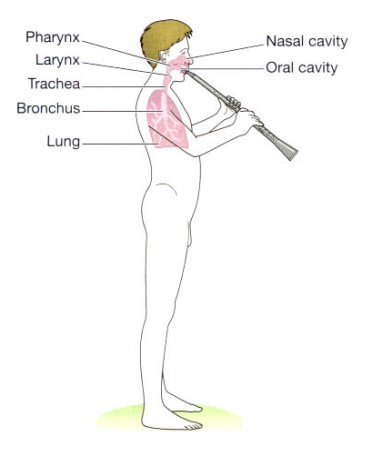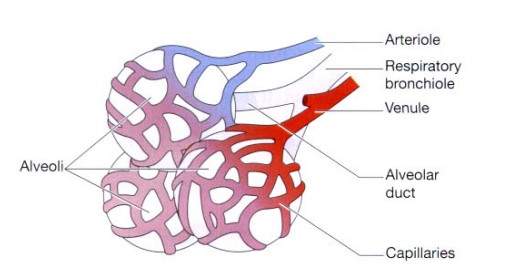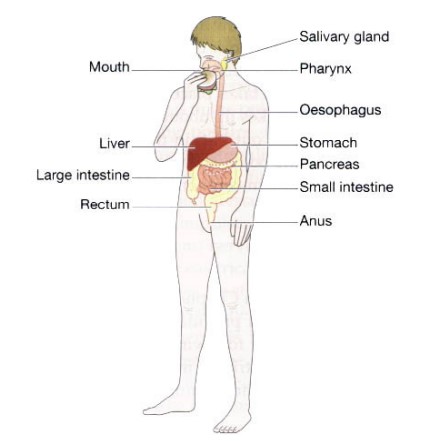Intake of raw materials and elimination of waste: The chemicals that must enter the body and be expelled from it are discussed in this section. The things the body needs to consume are oxygen, water, and food, while the things it excretes are carbon dioxide, urine, and faeces.
Table of Contents
Intake of oxygen-Intake of raw materials
A gas called oxygen makes up around 21% of the air in the atmosphere. Because the majority of chemical reactions that take place in body cells can only take place in its presence, a steady supply is necessary for human survival. The cascade of chemical events that cause the release of energy from nutrients requires oxygen.
During breathing, the respiratory system transports air from the nose to the lungs. The pharynx, which is also a component of the alimentary canal, the larynx, or voice box, the trachea, two bronchi (one bronchus to each lung), and many bronchial passageways are all involved in the movement of air, shown in the figure below.

These lead to alveoli, the numerous small air sacs that make up each lung. They are the locations where the crucial process of gas exchange between the lungs and the blood occurs, and they are encircled by a network of small capillaries, shown in the figure below.

Nitrogen, which makes up about 80% of atmospheric air, is breathed in and out but, in this gaseous form, it cannot be used by the body. The nitrogen needed by the body is present in protein-containing foods, mainly meat and fish.
Dietary intake-Intake of raw materials
Nutrition is considered in, a balanced diet is important for health and provides nutrients, and substances that are absorbed, often following digestion, and promote body function. Nutrients include water, carbohydrates, proteins, fats, vitamins, and mineral salts. They are required for:
- maintaining water balance within the body
- energy production, mainly carbohydrates, and fats
- synthesis of large and complex molecules, using mineral salts, proteins, fats, carbohydrates, and vitamins
- cell building, growth, and repair, especially proteins.
Digestion
Because most food is rarely in a state that the body cells can utilize and is chemically complicated, the digestive system has evolved. Its job is to digest food so that it may be taken into the bloodstream and utilized by the body’s cells. Auxiliary glands and the alimentary canal make up the digestive system.

Alimentary canal
This is a tube that begins at the mouth and continues through the pharynx, oesophagus, stomach, small and large intestines, rectum, and anus.
Glands
The salivary glands, the pancreas, and the liver are the auxiliary organs that are located outside the alimentary canal and have ducts that enter it. The walls of the alimentary canal contain several tiny glands as well. The majority of these glands produce the digestive enzymes needed for food’s chemical breakdown.
Metabolism
This is the sum total of the chemical activity in the body. It consists of two groups of processes:
- anabolism, building or synthesizing large and complex substances
- catabolism, breaking down substances to provide energy and raw materials for anabolism, and substances for excretion as waste.
The sources of energy are mainly the carbohydrates and fats provided by the diet. If these are in short supply, proteins are used.
Elimination of waste
Carbon dioxide
As previously mentioned, the respiratory system continuously excretes this. A byproduct of biological metabolism is carbon dioxide. To keep the pH (acidity or alkalinity) of the blood within a normal range, it dissolves in water to generate an acid that must be expelled in the proper proportions.
Urine
The kidneys, which are a component of the urinary system, are what create this. The illustration below shows the urinary system’s organs. Water and waste materials, primarily urea from protein breakdown, make up urine. The kidneys control the body’s water balance under the influence of endocrine system hormones. They assist in keeping blood pH within the desired range. Urine is held in the bladder until it is expelled during micturition. The nervous system is further involved in the process of micturition (passing urine).

Faeces
The waste materials from the digestive system are excreted as faeces containing:
- indigestible food residue that remains in the alimentary canal because it cannot be absorbed
- bile from the liver, which contains the waste products from the breakdown of red blood cells
- large numbers of microbes.
Elimination of faeces (defecation) also involves the nervous system.
Also read: Transport systems: Blood, Circulatory system, and Lymphatic system